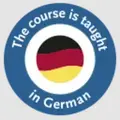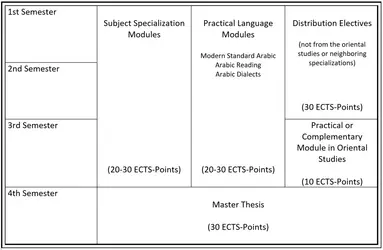The Master��s Program in Arabic Studies
Please note!

The "Arabic Studies" MA program is taught primarily in German. For enrolment and successful studies, you need knowledge of German at least at level B2 (and B1 in English) of the Common European Framework of Reference for Languages (CEFR). In case you have further general questions regarding application procedures at the University of Bamberg, please visit the Students' Advisory Service. If you have more specific questions with regard to the M.A. in Arabic Studies please do not hesitate to write to the Subject Advisory Person.
Please clarify the entry and residence regulations that apply to your nationality in advance with the authorities in charge (e.g. German embassies or consulates).
Studying the Master of Arabic Studies in Bamberg
The master's program in Arabic Studies provides you with in-depth knowledge of the Arabic language, literature and culture from the pre-Islamic period to the present. In Bamberg, you acquire the ability to analyze, interpret and classify classical and modern Arabic texts in their respective context. Particular attention is paid to the analysis of various genres from poetry and literary prose passing through historical texts to scientific encyclopedias and new forms of media expression. A liaison with other oriental fields of study as well as a close network with other philological and cultural disciplines at the University of Bamberg guarantee a comparative perspective and a diverse course of study, which enables you to choose your own specialization.
Structure of the Master's degree
The program is laid out on a four-semester timetable, and the curriculum comprises the writing of a master��s thesis, core content in at least one field of Arabic Studies and a distribution elective which may be defined according to students�� individual, interdisciplinary interests.
A total of 120 ECTS points must be earned, of which 60 are allotted to the core field, 30 to the distribution elective and the remaining 30 points to the master��s thesis.
The master's program in Arabic Studies can also be studied as a part-time course. You can find out more about this by consulting our advisory services.
A Glimpse of the Degree Goals
In the Master��s program in Arabic Studies, you will learn to scientifically examine Arabic sources and understand the various manifestations of Arabic language, literature and culture in their respective context. A variety of seminars and lectures give you in-depth insights into the history of Arabic literature. The term of literature, in this sense, broadly interprets in and includes anecdotes, novels and poems as well as historical reports, political speeches and philosophical treatises.
You will practice textual criticism, i.e. you receive and discuss Arabic texts in its original language and in translation, as well as research literature in German, English and Arabic. Furthermore, you can access both historical textual testimonies and current media formats through various methodological approaches.
Exercises with a focus on written and oral language practice ensure strengthening the active language competence, in addition to understanding sophisticated texts. Moreover, you have the opportunity to acquire competencies in the field of Arabic didactics and to engage with the teaching of Arabic as a foreign language in theory and practice.
Internships and study visits to Arab countries (e.g. at partner universities in Morocco and Algeria) can contribute to the course of studies. The electives area, also, offers the possibility of taking courses in neighboring Master��s programs (e.g. Iranian or Turkish Studies). Further examples of neighboring programs can be found on the homepage of the Institute for Oriental Studies.
Career Prospects
The master��s degree in Arabic Studies is qualification for various fields of professional activity.
The broad spectrum of analytical skills and the knowledge of language and literary history presented in the degree program enable graduates to represent and share the many diverse aspects of Arab culture.
Possible fields of employment open to graduates include librarianship, publishing, cultural education, political consulting, social work, adult education, public cultural education and tourism. The Arbeitskreis Orient (Middle Eastern Studies Students' Representation) organizes career information days for students of oriental subjects in Bamberg every two years.
The master��s degree in Arabic Studies also prepares graduates for the pursuit of doctoral studies. This is possible in the Bamberg Graduate School of Near and Middle Eastern Studies (BaGOS).
Few Good Reasons
There are a lot of good reasons to pursue your Master's degree in Arabic Studies at the University of Bamberg. The ratio of students to lecturers is ideal, seminar groups are small, lecturers are easily and directly approachable, and our specialist library is very well equipped. The acquisition of theoretical and methodological skills necessary to access classical and modern Arabic literature is a core objective of the program. And naturally, advanced language acquisition also plays a very important role. In addition to Arabic Studies, the Institute for Middle Eastern Studies is home to numerous subjects whose modules students may combine with the programme��s core curriculum: Iranian Studies; Islamic Studies; Turkish Studies; Islamic Art and Archaeology and Jewish Studies. Coordinating foreign studies is easy with our many partner universities. Lecturers and academic staff provide students with advice and assistance when choosing relevant institutions and organisations (for internships and language courses). In addition, the diverse activities hosted by the department of Arabic Studies open up unique networking opportunities.
The excellent relationship between students and lecturers allows for individual support during studies and in the transition to professional life.
Admission and Enrollment
Your qualifications
Requirements for an application for the M.A. in Arabic Studies:
- University degree (B.A. or higher) in the field of either Humanities or Social Sciences. Certificate and transcript of records are needed.
- Proof of at least 15 ECTS in the field of "Oriental Studies" (Arabic Studies, Islamic Studies, ...)
- Proof of at least 40 ECTS in Arabic language classes or proof of equivalent knowledge of Arabic.
- Proof of English language proficiency of at least level B1.
The Application deadline is the enrollment deadline.
Application process
If you fulfill the requirements mentioned above and have your documents ready, please follow the guideline for the application process as a non-exchange student.
Students at Bamberg University do not have to pay tuition. However, there is a fee for administrative costs at around 100� per term which also includes a bus ticket covering the whole city.
Accreditation
?Der Studiengang wird als wichtiger Bestandteil der Sprach- und Kulturausbildung an der Universit?t Bamberg gew��rdigt. Der Studiengang zeichnet sich durch eine besondere Profilierung aus, die es in Deutschland vergleichbar nur noch an wenigen anderen Universit?ten gibt. Die gro?e Flexibilit?t in der Studiengestaltung erm?glicht ein Studium entsprechend der jeweiligen Interessenlage bzgl. Vertiefung, Kombination mit fachfremden Lehrveranstaltungen bzw. Praktikum im arabischen Ausland. Besonders hervorzuheben sind die sehr gute Betreuung der Studierenden sowie die sehr gute Vernetzung, u.a. auch mit verschiedenen Hochschulen im arabischen Raum. Der Studiengang bietet neben guten Arbeitsmarkperspektiven eine hohe Relevanz im Zusammenhang mit aktuellen gesellschaftlichen und politischen Entwicklungen. Die Bedeutung des Transfers der Studieninhalte in die Gesellschaft ist entsprechend gro?. Positiv wird bei diesem Masterstudiengang zudem die M?glichkeit des Praktikums w?hrend des Studiums (Komplement?rmodul) hervorgehoben.��



